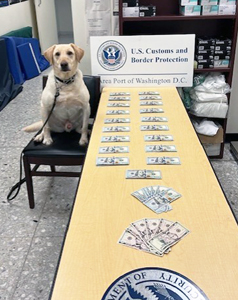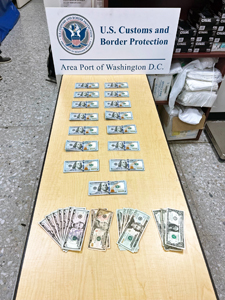CBP’s Furry Friend Fuzz Helps Catch Concealed Currency
STERLING, Va. – U.S. Customs and Border Protection officers remind travelers heading on overseas trips to comply with U.S. currency reporting laws after officers seized a combined $90,535 from five travelers during August at Washington Dulles International Airport.
Travelers can take as much currency or other monetary instruments they want on their international trips; however, federal law requires travelers to report all currency of $10,000 or greater to a CBP officer. CBP officers will assist travelers in completing the U.S. Treasury Department currency reporting form – the Report of International Transportation of Currency or Monetary Instruments [FINCEN 105].
Travelers can get an early start on reporting their currency by completing the FINCEN 105 PDF, or guided FINCEN 105 online form on CBP’s website prior to a CBP arrivals inspection or departure inspection.
In addition to having their currency seized, travelers risk other consequences, such as missing their departure or connecting flight, interrupting vacation plans, or facing potential criminal prosecution.
Of the five seizures, four were recorded on travelers departing the United States to either Bogota, Colombia, Doha, Qatar, or Accra, Ghana. The fifth seizure was recorded on a traveler arriving from Shanghai, China.
CBP currency detector dog Fuzz, a 4-year-old male yellow labrador retriever, helped to detect unreported currency during three of the seizures.
During each inspection, CBP officers explained U.S. currency reporting laws to the travelers and asked how much currency they possessed. Each of the travelers provided verbal and written declarations of their currency, and as necessary, officers helped travelers complete FINCEN 105 forms for those who reported over $10,000.
During subsequent searches of the travelers and their carryon baggage, CBP officers found additional unreported currency and seized the currency.
CBP is not releasing any of the travelers’ names because none were criminally charged.
“Customs and Border Protection urges travelers to research CBP’s website for laws and restrictions governing travel to and from the United States. A little bit of knowledge about the CBP inspection process can help travelers clear through Customs inspections much more quickly,” said Marc Calixte, CBP’s Area Port Director for the Area Port of Washington, D.C.
Travelers can Know Before You Go on their next international trip by reading our Top-10 Travel Tips and learn which items are Prohibited and Restricted from bringing back to the United States.
CBP agents and officers seized an average of about $183,000 in unreported or illicit currency every day last year at our nation’s borders. Agents and officers know that smuggled currency may sometimes be the proceeds of illegal activity, such as financial fraud and money scams, and conduct a robust enforcement mission to intercept bulk currency smuggling attempts.
CBP's border security mission is led at our nation’s Ports of Entry by CBP officers and agriculture specialists from the Office of Field Operations. CBP screens international travelers and cargo and searches for illicit narcotics, unreported currency, weapons, counterfeit consumer goods, prohibited agriculture, invasive weeds and pests, and other illicit products that could potentially harm the American public, U.S. businesses, and our nation’s safety and economic vitality.
See what CBP accomplished during "A Typical Day" in 2023.
Follow the Director of CBP’s Baltimore Field Office on X (formerly Twitter) at @DFOBaltimore for breaking news, current events, human interest stories and photos, and CBP’s Office of Field Operations on Instagram at @cbpfieldops.



